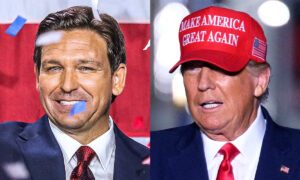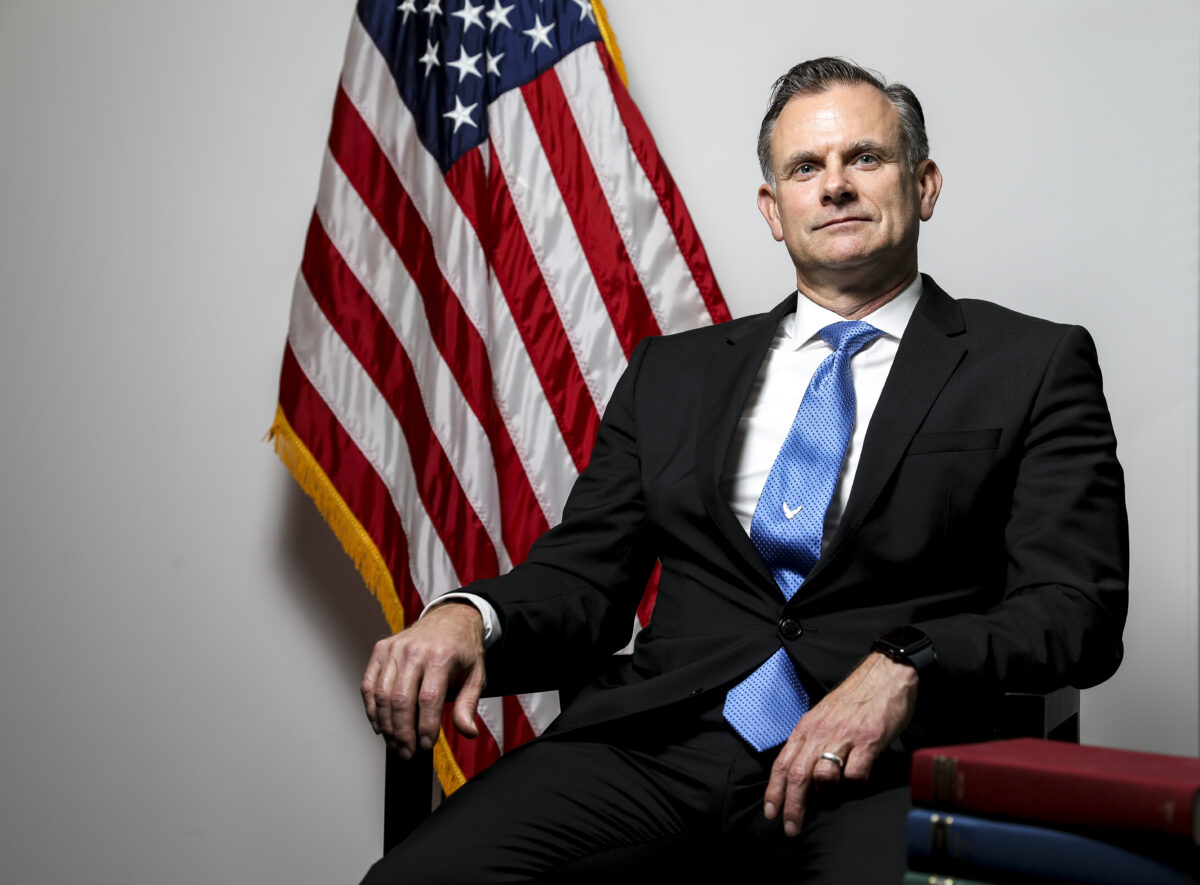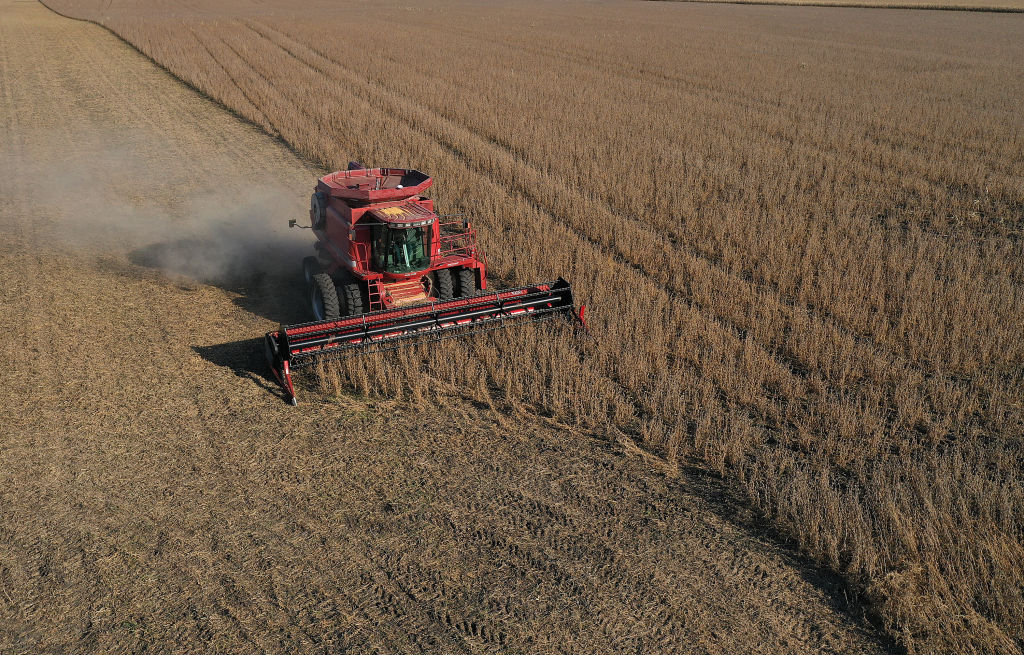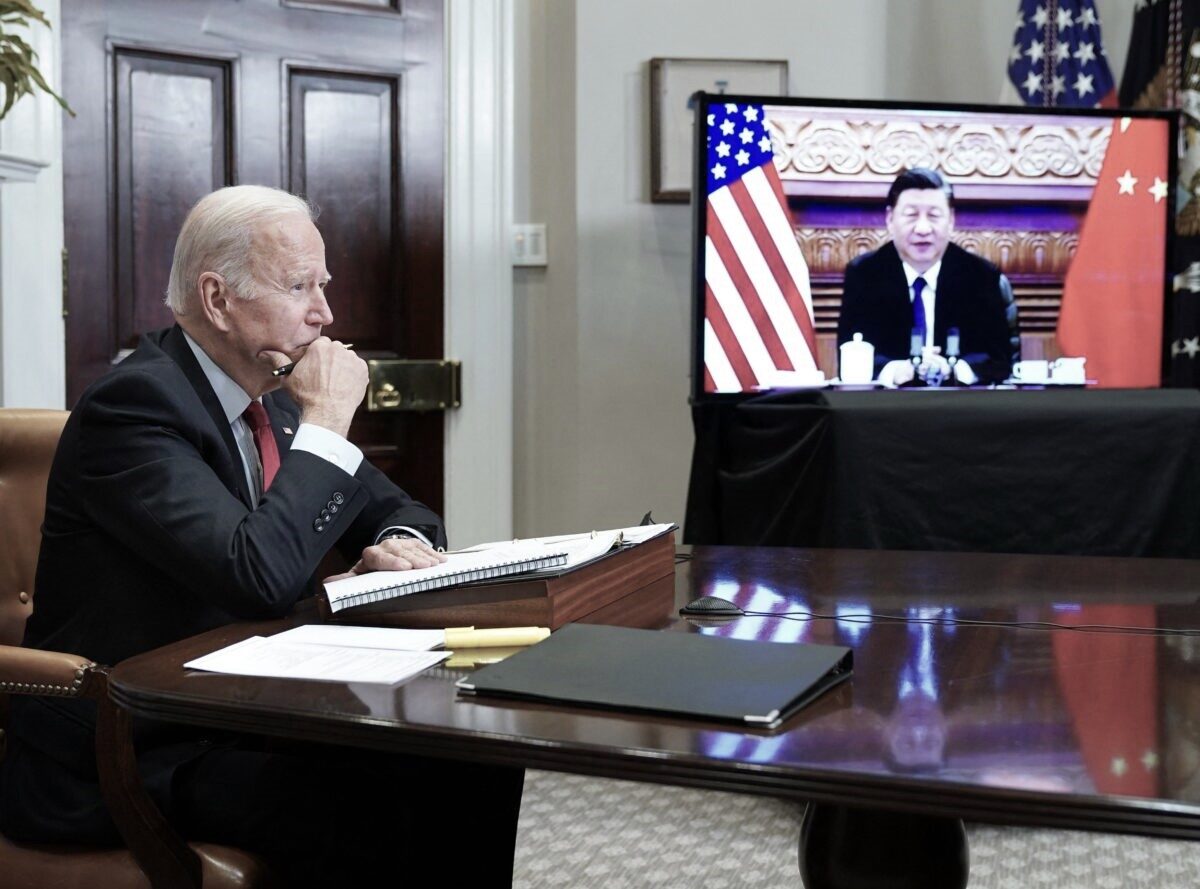Trump, DeSantis Should Ban China from Buying American Farmland, Critical Assets: Robert Spalding
Title III in the Defense Production Act gives the U.S. federal government “wide latitude” when protecting the United States’ national security. Consequently, if he once again wins the White House, President Donald Trump, can, and should, ban China from purchasing American assets, retired Brig. Gen. Robert Spalding said in an interview that aired on the “Newsmakers” Epoch Times-NTD collaborative program on Jan. 18. According to Spalding, Florida Gov. Ron DeSantis can also use his authority to limit Chinese purchases. The retired U.S. Air Force brigadier general is a U.S.-China relations expert and senior fellow at the Hudson Institute. Spalding also authored the book, “Stealth War: How China Took Over While America’s Elite Slept,” which investigates and exposes China’s success in infiltrating America’s institutions and compromising its national security. Retired Air Force Brigadier General Robert Spalding in Washington on Sept. 27, 2019. (Samira Bouaou/The Epoch Times) “Absolutely,” Spalding answered when asked if Trump and DeSantis could limit China’s purchases. For example, Spalding explained that during the Cold War, the United States and its Allies had a treaty that “ensured that nobody could trade technology with the Soviet Union.” He said that during World War II, the United States took specific precautions to safeguard American assets, and those options would be open to Trump and DeSantis. “During World War II, we nationalized the rubber and steel industries,” Spalding said. “All things are possible on behalf of national security. In fact, Title III in the Defense Production Act gives the federal government wide latitude in doing things that are to protect the national security. “In the case of China, they use financial relationships. They use the ability to buy assets in our country as a proxy for the way that, you know, traditional warfare happened.” Spalding said what China is doing is “almost like an invasion of the United States, just using money.” Stances of Trump and DeSantis on China In a campaign video released on Jan. 18, Trump stated, “China does not allow American companies to take over their critical infrastructure, and America should not allow China to take over our critical infrastructure.” He then stated the United States needs “aggressive new restrictions on Chinese ownership of any vital infrastructure in the United States, including energy, technology, telecommunications, farmland, natural resources, medical supplies, and other strategic national assets.” An aerial view from a drone shows a combine being used to harvest the soybeans in a field in Rippey, Iowa, on Oct. 14, 2019. (Joe Raedle/Getty Images) Similarly, DeSantis, a potential presidential rival for Trump, stated during a press conference on Jan. 10 that he, too, believes China poses a security risk and wants to ban Chinese entities from purchasing property in Florida. “If you look at the Chinese Communist Party, they’ve been very active throughout the Western Hemisphere in gobbling up land and investing in different things,” DeSantis said. “And, you know, when they have interests that are opposed to ours, and you’ve seen how they’ve wielded their authority … it is not in the best interests of Florida to have the Chinese Communist Party owning farmland, owning land close to military bases.” CCP Threat Spalding agreed with the assessments of Trump and DeSantis, adding, “It’s not just farmland … The Chinese Communist Party has been spending funds mostly through private members of the party buying huge swaths of land. For example, down in Texas, you had a former [People’s Liberation Army] general buying up hundreds of thousands of acres.” Spalding explained that the PLA general didn’t just want the land. Instead, he tried to turn it into a wind farm and plug it into the Texas power grid. Not only that, Spalding said, there are others “buying whole farms. They’re also meat processing and other agricultural assets.” More importantly, when the Chinese get ahold of America’s assets, they can use them in various ways. “[The Chinese] could do things in terms of polluting the land, making it fallow. They can also direct that agricultural product to China,” Spalding said. U.S. President Joe Biden meets with Chinese leader Xi Jinping during a virtual summit from the Roosevelt Room of the White House in Washington on Nov. 15, 2021. (Mandel Ngan/AFP via Getty Images) “In the past, they’ve used Chinese nationals to go out in the middle of fields, and dig up genetically modified seeds and take them back to China. You can use [the land] to collect intelligence on nearby bases or other manufacturing facilities. “There’s a whole lot of things that you can do when you own the land. In fact, the Chinese general in Texas was basically locking it up and making it so people couldn’t come on. So, you really didn’t have an idea of what’s going on.” Regarding Republicans in the House establishing a new select committee to ex

Title III in the Defense Production Act gives the U.S. federal government “wide latitude” when protecting the United States’ national security. Consequently, if he once again wins the White House, President Donald Trump, can, and should, ban China from purchasing American assets, retired Brig. Gen. Robert Spalding said in an interview that aired on the “Newsmakers” Epoch Times-NTD collaborative program on Jan. 18.
According to Spalding, Florida Gov. Ron DeSantis can also use his authority to limit Chinese purchases.
The retired U.S. Air Force brigadier general is a U.S.-China relations expert and senior fellow at the Hudson Institute. Spalding also authored the book, “Stealth War: How China Took Over While America’s Elite Slept,” which investigates and exposes China’s success in infiltrating America’s institutions and compromising its national security.

“Absolutely,” Spalding answered when asked if Trump and DeSantis could limit China’s purchases. For example, Spalding explained that during the Cold War, the United States and its Allies had a treaty that “ensured that nobody could trade technology with the Soviet Union.”
He said that during World War II, the United States took specific precautions to safeguard American assets, and those options would be open to Trump and DeSantis.
“During World War II, we nationalized the rubber and steel industries,” Spalding said. “All things are possible on behalf of national security. In fact, Title III in the Defense Production Act gives the federal government wide latitude in doing things that are to protect the national security.
“In the case of China, they use financial relationships. They use the ability to buy assets in our country as a proxy for the way that, you know, traditional warfare happened.”
Spalding said what China is doing is “almost like an invasion of the United States, just using money.”
Stances of Trump and DeSantis on China
In a campaign video released on Jan. 18, Trump stated, “China does not allow American companies to take over their critical infrastructure, and America should not allow China to take over our critical infrastructure.”
He then stated the United States needs “aggressive new restrictions on Chinese ownership of any vital infrastructure in the United States, including energy, technology, telecommunications, farmland, natural resources, medical supplies, and other strategic national assets.”

Similarly, DeSantis, a potential presidential rival for Trump, stated during a press conference on Jan. 10 that he, too, believes China poses a security risk and wants to ban Chinese entities from purchasing property in Florida.
“If you look at the Chinese Communist Party, they’ve been very active throughout the Western Hemisphere in gobbling up land and investing in different things,” DeSantis said.
“And, you know, when they have interests that are opposed to ours, and you’ve seen how they’ve wielded their authority … it is not in the best interests of Florida to have the Chinese Communist Party owning farmland, owning land close to military bases.”
CCP Threat
Spalding agreed with the assessments of Trump and DeSantis, adding, “It’s not just farmland … The Chinese Communist Party has been spending funds mostly through private members of the party buying huge swaths of land. For example, down in Texas, you had a former [People’s Liberation Army] general buying up hundreds of thousands of acres.”
Spalding explained that the PLA general didn’t just want the land. Instead, he tried to turn it into a wind farm and plug it into the Texas power grid. Not only that, Spalding said, there are others “buying whole farms. They’re also meat processing and other agricultural assets.”
More importantly, when the Chinese get ahold of America’s assets, they can use them in various ways. “[The Chinese] could do things in terms of polluting the land, making it fallow. They can also direct that agricultural product to China,” Spalding said.

“In the past, they’ve used Chinese nationals to go out in the middle of fields, and dig up genetically modified seeds and take them back to China. You can use [the land] to collect intelligence on nearby bases or other manufacturing facilities.
“There’s a whole lot of things that you can do when you own the land. In fact, the Chinese general in Texas was basically locking it up and making it so people couldn’t come on. So, you really didn’t have an idea of what’s going on.”
Regarding Republicans in the House establishing a new select committee to examine the threats posed by China and if they’ll take action, Spalding said, “Well, what happens is Corporate America, and Wall Street typically lobbies both the Hill and the administration to water down any legislation that’s meant to go after the Chinese Communist Party.
“Washington DC is full of think tanks. It’s full of law firms that the Chinese Communist Party have retained … They have locked down Washington DC in ways that really make it hard for us to create policies that protect the country.”







